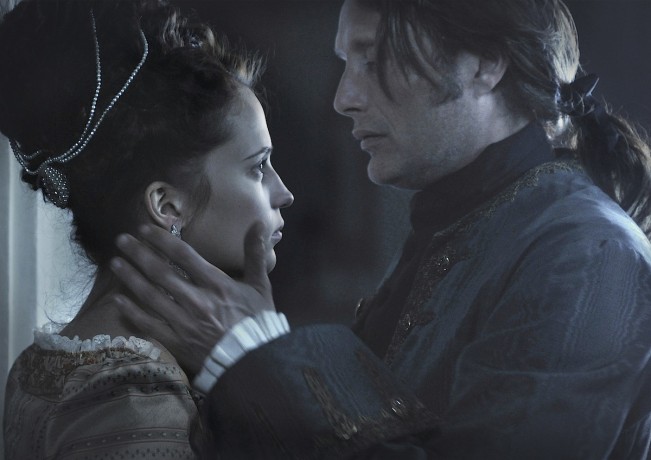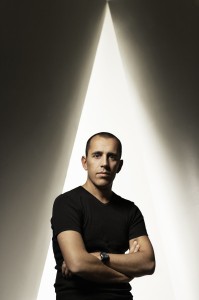By Andrea Gronvall andreagronvall@aol.com
The Gronvall Files: A ROYAL AFFAIR To Remember With Filmmaker Nikolaj Arcel
Once a staple of the Golden Age of Hollywood, costume dramas are an iffy bet these days. Minus the vast resources of the old studio system, with its contract players, armies of technicians, numerous sound stages and back lot sets—not to mention extensive wardrobe collections—the cost of mounting period dramas is daunting. Plus the lack of interest many American moviegoers show in any history that pre-dates their childhood years has made the genre a harder sell. For instance, Sofia Coppola’s Marie Antoinette under-performed at the box office (although you certainly could argue that middling reviews didn’t help).
I haven’t yet seen Keira Knightley in Joe Wright’s Anna Karenina or Daniel Day-Lewis in Steven Spielberg’s Lincoln, so I can’t weigh in on the merits or potential of those two films. But I have seen an outstanding historical drama that I hope will beat the odds: Denmark’s submission for the Best Foreign Language Film Oscar, A Royal Affair. The Magnolia Pictures release is directed by Nicolaj Arcel, who wrote the screenplay with Rasmus Heisterberg, his co-scribe on the Swedish-language film adaptation of The Girl With the Dragon Tattoo. A tale of romance and court intrigue based on actual events that occurred in late 18th-century Europe, A Royal Affair stars Mads Mikkelsen and dazzling newcomer Alicia Vikander (who, coincidentally, also appears in Anna Karenina).
Vikander portrays Caroline, an educated, vibrant young English aristocrat who is married off to the eccentric, spoiled, and volatile Danish king, Christian VII, strikingly played by first-time screen actor Mikkel Boe Folsgaard (who won the Best Actor prize earlier this year at the Berlin International Film Festival). Although the new queen quickly produces an heir to the throne, her marriage founders due to her husband’s neglect and the malice of his ambitious stepmother, who connives with the court to use the monarch as their puppet. On a tour of Europe the lonely king acquires a new personal physician who becomes his friend and confidante, a German named Struensee (Mikkelsen). The doctor is steeped in the latest scientific discoveries, as well as the anti-feudal philosophies of the Enlightenment—including revolutionary concepts like the rights of man. Christian returns to Denmark with Struensee, and gradually a high-stakes triangle forms, as king, queen, and physician implement major reforms in the beleaguered nation. But their efforts are deeply resented in the corridors of power.
A Royal Affair was featured in the recently concluded 48th Chicago International Film Festival, and director Arcel was an honored guest.
Andrea Gronvall: Since Movie City News often focuses on the business of movies, I’d like to ask about the role of your executive producer, Lars von Trier. In America it’s not unusual for someone to get a producing credit for doing only one thing—say, bringing a star on board. What were his contributions to A Royal Affair?
Nikolaj Arcel: Lars’s name can help you get financing, whereas mine cannot. It took three years to finance the film; the money for the $6.5 million budget came from four different countries–although Denmark funds 50% of 20 Danish films each year. But more than his influence there I wanted his help on the screenplay and in the editing.
AG: And what advice did he give you?
NA: Originally I was trying to focus on one character, but Lars said I had to split the focus between Mads’ and Alicia’s characters. He also said I needed to make the film an epic, and not worry that people will have to wait a while for the story to get going. And in Denmark, we have a group of directors who meet to critique each other’s footage: Lars is one, and Thomas Vinterberg [The Celebration, The Hunt], Ole Christian Madsen [Flame and Citron, Prague], Susanne Bier [After the Wedding, A Better World]. Lars came to the edit eight to ten times, and guided us through.
AG: What was the most technically-challenging scene to shoot, and how did you pull it off?
NA: I had three different ballroom scenes, but only one night in which to shoot them in our location. We used three cameras and kept jumping about. I wanted to create as much of a comfort zone as possible for the actors, but as it got closer to sunrise, we had to avoid daylight seeping in. So we had to keep moving the set back, away from the windows!
AG: I was impressed by how graceful a dancer Mads Mikkelsen is in those scenes.
NA: He was trained as a ballet dancer. So was Alicia.
AG: I read an interview that he gave some time ago to The New York Times, in which he said there was so much that he wanted to do that he couldn’t see the point of sleeping more than four hours a night. Later I read that during the filming of A Royal Affair he would wake you in the middle of the night with ideas of what to do on the set the next morning.
NA: Mads takes his work seriously, and he loves his job.
AG: My editor David Poland says that Alicia Vikander is going to be The Next Big Thing.
NA: Not only is she in Anna Karenina [coming out at the same time as A Royal Affair], but she also recently signed to appear opposite Jeff Bridges and Julianne Moore in Seventh Son.
AG: I still can’t get over the performance by Mikkel Boe Folsgaard: his king is chilling and monumentally self-absorbed, but also needy, and funny, and ultimately sympathetic. What a discovery!
NA: Our movie was his first. He has an enormous amount of talent, a very raw talent. He was totally open, completely not intimidated, which led to my casting him.
AG: Watching your movie about the history of Denmark made me think about the history of the United States. My country was born during the Enlightenment, the same period your film covers. Our founding fathers fought a revolution to free us from the tyranny of kings. Yet today so many Americans are obsessed with royalty, even though we have none—by design! On the other hand, in Europe, which still has quite a few royal families, most people are not all that impressed by monarchs. What’s that about?
NA: In Denmark we still have a Queen. She is nice, we’re used to her, but she is not an object of fascination. For us, our obsession is with movie people; we are fascinated by your film culture.
AG: A Royal Affair is 180 degrees apart from one of your famous earlier projects. After the success of The Girl With the Dragon Tattoo, were you afraid of being typecast?
NA: I wasn’t afraid of being typecast; I was being typecast! [Laughs] But I’m working on a crime thriller again, the screenplay for The Keeper of Lost Causes, a novel by Jussi Adler-Olsen that made The New York Times bestseller list. It’s the first film of a trilogy.
AG: What would be the one thing you’d most like audiences to take home from A Royal Affair?
NA: Obviously, for Danish audiences it has a lot more resonance because it’s about Danish history. But then there’s the idea that someone who comes from nothing can become like a king, and work with good intentions. Why do we always punish these visionaries, instead of supporting them? The movie is also about freedom: do you accept your position in life? A Royal Affair is about the freedom to love, the freedom of self-expression.
AG: And what those are worth.















